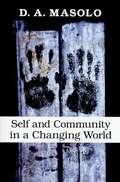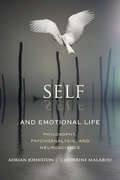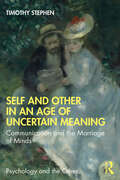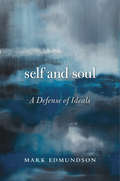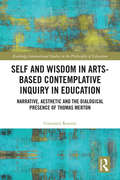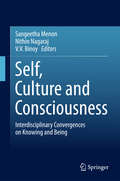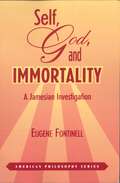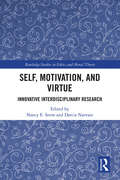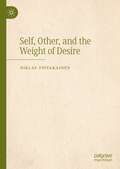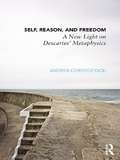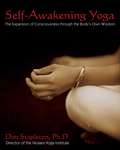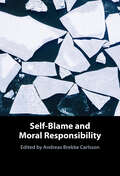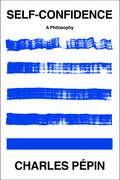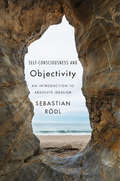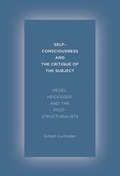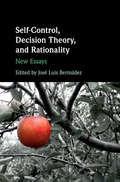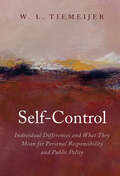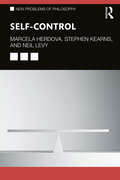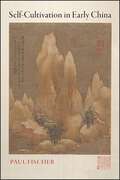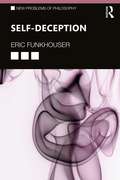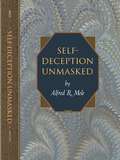- Table View
- List View
Self and Community in a Changing World
by D. A. MasoloRevisiting the classic questions of African philosophy, Masolo reframes indigenous knowledge as diversity & moves to a consideration of the vexed question of human rights abuses. He offers solutions for the containment of socially destructive conduct and antisocial tendencies through the engagement of community.
Self and Emotional Life: Philosophy, Psychoanalysis, and Neuroscience (Insurrections: Critical Studies in Religion, Politics, and Culture)
by Catherine Malabou Adrian JohnstonAdrian Johnston and Catherine Malabou defy theoretical humanities' deeply-entrenched resistance to engagements with the life sciences. Rather than treat biology and its branches as hopelessly reductive and politically suspect, they view recent advances in neurobiology and its adjacent scientific fields as providing crucial catalysts to a radical rethinking of subjectivity.Merging three distinct disciplines—European philosophy from Descartes to the present, Freudian-Lacanian psychoanalysis, and affective neuroscience—Johnston and Malabou triangulate the emotional life of affective subjects as conceptualized in philosophy and psychoanalysis with neuroscience. Their experiments yield different outcomes. Johnston finds psychoanalysis and neurobiology have the potential to enrich each other, though affective neuroscience demands a reconsideration of whether affects can be unconscious. Investigating this vexed issue has profound implications for theoretical and practical analysis, as well as philosophical understandings of the emotions.Malabou believes scientific explorations of the brain seriously problematize established notions of affective subjectivity in Continental philosophy and Freudian-Lacanian analysis. She confronts philosophy and psychoanalysis with something neither field has seriously considered: the concept of wonder and the cold, disturbing visage of those who have been affected by disease or injury, such that they are no longer affected emotionally. At stake in this exchange are some of philosophy's most important claims concerning the relationship between the subjective mind and the objective body, the structures and dynamics of the unconscious dimensions of mental life, the role emotion plays in making us human, and the functional differences between philosophy and science.
Self and Other in an Age of Uncertain Meaning: Communication and the Marriage of Minds (Psychology and the Other)
by Timothy StephenSelf and Other in an Age of Uncertain Meaning explores the nature and origins of widespread problems of self in modern societies. It examines the paradoxical interplay between the modern world's many benefits and freedoms, and its mounting social challenges and psycho-emotional impacts. Over time the character of consciousness has shifted in concert with societal trends. The experienced world has become more nuanced, fragmented, and uncertain, as well as increasingly personal and intimate, reshaping social relationships. Chapters analyze the interdependence of language, mind, intimacy, the self, and culture, arguing that as the coevolution of these five factors produced the modern world, many features of contemporary culture have become disruptive to security of being. The book explores the importance to the vital sense of self in constructing relationships based in mutual recognition of moral and intellectual equality between partners.Rich with examples from everyday experience, this text offers profound insights for those interested in sociology, psychoanalysis, psychology, communication, history, and culture.
Self and Soul: A Defense of Ideals
by Mark EdmundsonIn a culture of the Self that has become progressively more skeptical and materialistic, we spare little thought for the great ideals--courage, contemplation, and compassion--that once gave life meaning. Here, Mark Edmundson makes an impassioned attempt to defend the value of these ancient ideals and to resurrect Soul in the modern world.
Self and Soul: A Defense of Ideals
by Mark EdmundsonIn a culture that has become progressively more skeptical and materialistic, the desires of the individual self stand supreme, Mark Edmundson says. We spare little thought for the great ideals that once gave life meaning and worth. Self and Soul is an impassioned effort to defend the values of the Soul. Edmundson guides readers back to the ancient sources of the three great ideals: courage, contemplation, and compassion. Homerâe(tm)s Iliad presents two contrasting versions of the heroic ideal: Achilles, who risks everything to become the greatest of warriors, and Hector, who sacrifices his life to defend his people. Platoâe(tm)s quest is for timeless truth: he is the prime example of the authentic thinker, concentrating the ideal of contemplation. The third great ideal, compassion, is embodied by Jesus, the Buddha, and Confucius, who taught loving kindness, forgiveness, and forbearance in a world where such qualities are difficult and sometimes dangerous to espouse. Shakespeare and Freud are the modern worldâe(tm)s great enemies of these ideals, Edmundson argues. Shakespeare detests chivalry and has little time for faith and philosophy. Freud sees ideals as illusions that will inevitably betray us. But between them, a new ideal arises: imaginative creation, exemplified by Blake and Shelley. Self and Soul is, as Edmundson provocatively writes, an attempt to resurrect Soul in the modern world.
Self and Wisdom in Arts-Based Contemplative Inquiry in Education: Narrative, Aesthetic and the Dialogical Presence of Thomas Merton (Routledge International Studies in the Philosophy of Education)
by Giovanni RossiniBy foregrounding a first-person perspective, this text enacts and explores self-reflection as a mode of inquiry in educational research and highlights the centrality of the individual researcher in the construction of knowledge. Engaging in particular with the work of Thomas Merton through a dialogical approach to his writings, Self and Wisdom in Arts-Based Contemplative Inquiry in Education offers rich examples of personal engagement with text and art to illustrate the pervasive influence of the personal in reflective, narrative, and aesthetic forms of inquiry. Chapters consider methodological and philosophical implications of self-study and contemplative research in educational contexts, and show how dialogic approaches can enrich empirical forms of inquiry, and inform pedagogical practice. In its embrace of a contemplative voice within an academic treatise, the text offers a rich example of arts-based contemplative inquiry. This unique text will be of interest to postgraduate scholars, researchers, and academics working in the fields of educational philosophy, arts-based and qualitative research methodologies and Merton studies.
Self, Culture and Consciousness: Interdisciplinary Convergences On Knowing And Being
by Sangeetha Menon V. V. Binoy Nithin NagarajThis volume brings together the primary challenges for 21st century cognitive sciences and cultural neuroscience in responding to the nature of human identity, self, and evolution of life itself. Through chapters devoted to intricate but focused models, empirical findings, theories, and experiential data, the contributors reflect upon the most exciting possibilities, and debate upon the fundamental aspects of consciousness and self in the context of cultural, philosophical, and multidisciplinary divergences and convergences. Such an understanding and the ensuing insights lie in the cusp of philosophy, neurosciences, psychiatry, and medical humanities. In this volume, the editors and contributors explore the foundations of human thinking and being and discuss both evolutionary/cultural embeddedness, and the self-orientation, of consciousness, keeping in mind questions that bring in the interdisciplinary complexity of issues such as the emergence of consciousness, relation between healing and agency, models of altered self, how cognition impacts the social self, experiential primacy as the hallmark of consciousness, and alternate epistemologies to understand these interdisciplinary puzzles.
Self, God and Immortality: A Jamesian Investigation (American Philosophy #Vol. 12)
by Eugene FontinellCan we who have been touched by the scientific, intellectual, and experimental revolutions of modern and contemporary times still believe with and degree of coherence and consistency that we as individual persons are immortal. Indeed, is there even good cause to hope that we are? In examining the present relationship of reason to faith, can we find justifying reasons for faith? These are the central questions in Self, God, and Immortality, a compelling exercise in philosophical theology. Drawing upon the works of William James and the principles of American Pragmatism, Eugene Fontinell extrapolates carefully from "data given in experience" to a model of the cosmic process open to the idea that individual identity may survive bodily dissolution. Presupposing that the possibility of personal immortality has been established in the first part, the second part of the essay is concerned with desirability. Here, Fontinell shows that, far from diverting attention and energies from the crucial tasks confronting us here and now, such belief can be energizing and life enhancing. The wider importance of Self, God, and Immortality lies in its pressing both immortality-believers and terminality-believers to explore both the metaphysical presuppositions and the lived consequences of their beliefs. It is the author's expressed hope that such explorations, rather than impeding, will stimulate co-operative efforts to create a richer and more humane community.
Self, Motivation, and Virtue: Innovative Interdisciplinary Research (Routledge Studies in Ethics and Moral Theory)
by Darcia Narvaez Nancy E. SnowThis volume features new findings by nine interdisciplinary teams of researchers on the topics of self, motivation, and virtue. Nine chapters bringing together scholars from the fields of philosophy, psychology, neuroscience, and sociology advance our substantive understanding of these important topics, and showcase a variety of research methods of interdisciplinary interest. Essays on Buddhism and the self in the context of romantic relationships, the development of personal projects and virtue, the notion of self-distancing and its moral impact, virtues as self-integrated traits, humility and the self in loving encounter, the importance of nation and faith in motivating virtue in western and non-western countries, roles for the self and virtue in eudaimonic growth, overcoming spiritual violence and sacramental shame in Christian communities, and an investigation into the moral self highlight the range and diversity of topics explored in this volume. The concept of deep integration also characterizes this work: each member of the interdisciplinary teams was fully and equally invested in their project from inception to completion. This approach invites teams to examine their disciplinary assumptions, rethink familiar concepts, and adjust methodologies in order to view their topics with fresh eyes. The result is not only new findings of substantive and methodological interest, but also an interesting glimpse into the thinking of the researchers as they sought interdisciplinary common ground in their research. Self, Motivation, and Virtue will be of interest to scholars in philosophy, moral psychology, neuroscience, and sociology who are working on these topics.
Self, Other, and the Weight of Desire
by Niklas ToivakainenThis is a book about the moral-existential nature of, and the desire inscribed in, the deadlocks generated by our attempts to ground and exhaustively explain the concerns that provoke philosophical reflection.While the book argues that these deadlocks are symptomatic of an impossibility internal to the very enterprise of grounding and explanation, it does not, however, declare any substantial groundlessness. Rather, the book shows that the choice between secure ground and groundlessness, or between final explanations and the inexplicable, is ultimately arbitrary. Instead, through readings of the so-called hard problem of consciousness, of Descartes’ first principle of philosophy, of Plato’s dialogue Gorgias, and of Lacan and Wittgenstein, Toivakainen argues that the actual point of significance, the sense of the impossibility or deadlock, must be traced back to the claims of desire that inform the very movement of grounding and explanation, a desire that is inscribed in a constitutive and inescapable address between self and other. In short, the book translates and rewrites points of structural deadlock into their (original) moral-existential landscapes by following traces of desire.
Self, Reason, and Freedom: A New Light on Descartes' Metaphysics
by Andrea ChristofidouFreedom and its internal relation to reason is fundamental to Descartes’ philosophy in general, and to his Meditations on First Philosophy in particular. Without freedom his entire enquiry would not get off the ground, and without understanding the rôle of freedom in his work, we could not understand what motivates key parts of his metaphysics. Yet, not only is freedom a relatively overlooked element, but its internal relation to reason has gone unnoticed by most studies of his philosophy. Self, Reason, and Freedom: A New Light on Descartes’ Metaphysics, by defending freedom’s internal relation to reason, sheds new light on Descartes’ metaphysics and restores the often dismissed Fourth Meditation to the core of his metaphysics as he conceived it. Implicit in that relation is a rejection of any authority external to reason. Andrea Christofidou shows how this lends strength and explanatory force to Descartes’ enquiry, and reveals his conception of the unity of the self and of its place in the world. Self, Reason, and Freedom: A New Light on Descartes’ Metaphysics is essential reading for students and scholars of Descartes and anyone studying seventeenth-century philosophy.
Self-Awakening Yoga: The Expansion of Consciousness through the Body's Own Wisdom
by Don StapletonTakes yoga back to its roots as a creative learning process and an expansion of consciousness, not just a technique for health and fitness • Provides simple techniques that enhance the free flow of prana to promote physical and emotional healing, self-discovery, and spiritual evolution • Includes over 100 exercises and meditations for a self-structured practice • Teaches how to release the body’s inefficient, painful patterns and to access unknown potentials through kinesthetic inquiries When artist and professor Don Stapleton discovered yoga, it marked the beginning of a journey into the awakening powers of prana--the energy of yogic purification--and the natural spiritual and healing properties of his own body. After 30 years of extensive yoga training, an accident left him with a severe injury to the spine. Faced with the challenge of physical recovery, Stapleton drew upon his knowledge of yoga to create a series of exercises that allowed him to recover freedom of movement, release emotional blockages, and unleash his spiritual and physical potential. Self-Awakening Yoga is the synthesis of Stapleton’s practice. More than 100 exercises--from focusing on the breath to accessing primal sound--show how to unlock the wisdom and power of prana to engage the body’s healing powers. His simple exercises and meditations focus on natural movements that encourage body awareness. Readers learn how to listen to what the body is saying before engaging in any specific yoga postures. Self-Awakening Yoga takes yoga back to its roots as a creative learning process and an expansion of consciousness, not just a technique for health and fitness.
Self-Awareness in Islamic Philosophy
by Jari KaukuaThis important book investigates the emergence and development of a distinct concept of self-awareness in post-classical, pre-modern Islamic philosophy. Jari Kaukua presents the first extended analysis of Avicenna's arguments on self-awareness - including the flying man, the argument from the unity of experience, the argument against reflection models of self-awareness, and the argument from personal identity - arguing that all these arguments hinge on a clearly definable concept of self-awareness as pure first-personality. He substantiates his interpretation with an analysis of Suhrawardī's use of Avicenna's concept and Mullā Sadrā's revision of the underlying concept of selfhood. The study explores evidence for a sustained, pre-modern and non-Western discussion of selfhood and self-awareness, challenging the idea that these concepts are distinctly modern, European concerns. The book will be of interest to a range of readers in history of philosophy, history of ideas, Islamic studies, and philosophy of mind.
Self-Blame and Moral Responsibility
by Andreas Brekke CarlssonSelf-blame is an integral part of our lives. We often blame ourselves for our failings and experience familiar unpleasant emotions such as guilt, shame, regret, or remorse. Self-blame is also what we often aim for when we blame others: we want the people we blame to recognize their wrongdoing and blame themselves for it. Moreover, self-blame is typically considered a necessary condition for forgiveness. However, until now, self-blame has not been an integral part of the theoretical debate on moral responsibility. This volume presents twelve new essays by leading moral philosophers, who set out bold new theories of the nature and ethics of self-blame, and the interconnection between self-blame and moral responsibility. The essays cast new light on traditional problems in the debate on moral responsibility and open new, exciting avenues for research in moral philosophy, moral psychology and the philosophy of punishment.
Self-Confidence: A Philosophy
by Charles PépinInspired by great figures from Emerson and Nietzsche to Madonna and Serena Williams, this engaging philosophical essay explores the workings of self-confidence and how to develop it. Where does self-confidence come from? How does it work? What makes it stronger or weaker? Why are some people more confident than others? Is it only a question of temperament or the result of conscious self-improvement? How do you get closer to those who stand out thanks entirely to their confidence in themselves? Drawing on philosophical texts, ancient wisdom, positive psychology, and a wide range of case studies that feature famous thinkers, artists, and athletes, but also unsung heroes such as a fighter pilot and an urgent-care doctor, Charles Pépin brings to light the strange alchemy that is self-confidence. In doing so, he gives us the keys to having more confidence in ourselves.
Self-Consciousness and Objectivity: An Introduction to Absolute Idealism
by Sebastian RödlSebastian Rödl undermines a foundational dogma of contemporary philosophy: that knowledge, in order to be objective, must be knowledge of something that is as it is, independent of being known to be so. This profound work revives the thought that knowledge, precisely on account of being objective, is self-knowledge: knowledge knowing itself.
Self-Consciousness and the Critique of the Subject: Hegel, Heidegger, and the Poststructuralists
by Simon LumsdenRevisiting the philosopher's key texts, Lumsden calls attention to Hegel's reformulation of liberal and Cartesian conceptions of subjectivity, identifying a critical though unrecognized continuity between poststructuralism and German idealism
Self-Consciousness and the Critique of the Subject: Hegel, Heidegger, and the Poststructuralists
by Simon LumsdenRevisiting the philosopher's key texts, Lumsden calls attention to Hegel's reformulation of liberal and Cartesian conceptions of subjectivity, identifying a critical though unrecognized continuity between poststructuralism and German idealism
Self-Consciousness and the Critique of the Subject: Hegel, Heidegger, and the Poststructuralists
by Simon LumsdenPoststructuralists hold Hegel responsible for giving rise to many of modern philosophy's problematic concepts—the authority of reason, self-consciousness, the knowing subject. Yet, according to Simon Lumsden, this animosity is rooted in a fundamental misunderstanding of Hegel's thought, and resolving this tension can not only heal the rift between poststructuralism and German idealism but also point these traditions in exciting new directions. Revisiting the philosopher's key texts, Lumsden calls attention to Hegel's reformulation of liberal and Cartesian conceptions of subjectivity, identifying a critical though unrecognized continuity between poststructuralism and German idealism. Poststructuralism forged its identity in opposition to idealist subjectivity; however, Lumsden argues this model is not found in Hegel's texts but in an uncritical acceptance of Heidegger's characterization of Hegel and Fichte as "metaphysicians of subjectivity." Recasting Hegel as both post-Kantian and postmetaphysical, Lumsden sheds new light on this complex philosopher while revealing the surprising affinities between two supposedly antithetical modes of thought.
Self-Control, Decision Theory, and Rationality: New Essays
by José Luis BermúdezThinking about self-control takes us to the heart of practical decision-making, human agency, motivation, and rational choice. Psychologists, philosophers, and decision theorists have all brought valuable insights and perspectives on how to model self-control, on different mechanisms for achieving and strengthening self-control, and on how self-control fits into the overall cognitive and affective economy. Yet these different literatures have remained relatively insulated from each other. Self-Control, Decision Theory, and Rationality brings them into dialog by focusing on the theme of rationality. It contains eleven newly written essays by a distinguished group of philosophers, psychologists, and decision theorists, together with a substantial introduction, collectively offering state-of-the-art perspectives on the rationality of self-control and the different mechanisms for achieving it.
Self-Control: Individual Differences and What They Mean for Personal Responsibility and Public Policy
by W. L. TiemeijerGood self-control is a crucial factor in the distribution of life outcomes, ranging from success at school and work, to good mental and physical health, and to satisfying romantic relationships. While in the last decades psychologists have learned much about this all-important trait, both social theory and politics have not caught up. Many academics and policymakers still seem to believe that everybody has unlimited capacity for self-control and that maintaining discipline is purely a matter of volition. This book shows that such beliefs are fundamentally mistaken. It presents the state-of-the-art in research on self-control, explains why this trait has been largely overlooked, and sets out the profound implications of this psychological research for moral responsibility, distributive justice and public policy. It shows that the growing emphasis in politics on 'personal responsibility' is deeply problematic, and outlines alternatives more in accord with human psychology.
Self-Control: Perspectives From Philosophy, Psychology, And Neuroscience (New Problems of Philosophy)
by Neil Levy Marcela Herdova Stephen KearnsSelf-control is a fundamental part of what it is to be a human being. It poses important philosophical and psychological questions about the nature of belief, motivation, judgment, and decision making. More immediately, failures of self-control can have high costs, resulting in ill-health, loss of relationships, and even violence and death, whereas strong self-control is also often associated with having a virtuous character. What exactly is self-control? If we lose control can we still be free? Can we be held responsible for loss of self-control? In this thorough and clearly written introduction to the philosophy of self-control the authors examine and assess the following topics and questions: The importance of self-control What is self-control? Self-control and the law of desire Mechanisms of self-control How is it possible to lose self-control? Blameworthiness and (the loss of) self-control Externalist self-control Pathologies of self-control. Combining philosophical analysis with surveys of the latest psychological research, and including chapter summaries, suggestions for further reading, and a glossary of key terms, Self-Control is essential reading for students of philosophy of mind and psychology, moral psychology, free will, and ethics. It will also be of interest to those in related fields such as psychology and cognitive science.
Self-Cultivation in Early China (SUNY series in Chinese Philosophy and Culture)
by Paul FischerSelf-Cultivation in Early China is an introduction to multiple aspects of the foundational practice of self-cultivation in early China (c.1000 to 100 BCE). Drawing on the Chinese classics and the dozens of scholars' texts (both received and excavated) that together form the basis of intellectual history for China and all of East Asia, the book's analysis relies on the topics and categories that were central to the thought of these authors, including such well-known thinkers as Confucius and Laozi. This book describes a salient point of view from which we may consider the broader landscape of Chinese intellectual history and presents an important paradigm of the scholarly Chinese worldview that is ideal for comparison with paradigms in other communities, ancient or modern, across the globe.
Self-Deception (New Problems of Philosophy)
by Eric FunkhouserSelf-deception poses longstanding and fascinating paradoxes. Philosophers have questioned whether, and how, self-deception is even possible; evolutionary theorists have debated whether it is adaptive. For Sigmund Freud self-deception was a fundamental key to understanding the unconscious, and from The Bible to The Great Gatsby literature abounds with characters renowned for their self-deception. But what exactly is self-deception? Why is it so puzzling? How is it performed? And is it harmful? In this thorough and clearly written introduction to the philosophy and psychology of self-deception, Eric Funkhouser examines and assesses these questions and more: Clarification of the conceptual background and "Basic problem" of self-deception, including Freud and Davidson and the important debate between intentionalists and motivationalists Deflationary accounts that appeal to cognitive and motivational biases, with emphasis on how motives and emotions drive self-deception Intentional self-deception and the "divided mind," including the role of the unconscious in recent psychological research Challenges that self-deception poses for philosophy of mind and psychology, especially for our understanding of intention, belief, and deception Biology and moral psychology of self-deception: Is self-deception functional or beneficial? Are the self-deceived to be held accountable? Combining philosophical analysis with the latest psychological research, and including features such as chapter summaries, annotated recommended reading and a glossary, Self-Deception is an excellent resource for students of philosophy of mind and psychology, moral psychology and ethics, as well as those in related fields such as psychology and cognitive science.
Self-Deception Unmasked (Princeton Monographs in Philosophy #6)
by Alfred R. MeleSelf-deception raises complex questions about the nature of belief and the structure of the human mind. In this book, Alfred Mele addresses four of the most critical of these questions: What is it to deceive oneself? How do we deceive ourselves? Why do we deceive ourselves? Is self-deception really possible? Drawing on cutting-edge empirical research on everyday reasoning and biases, Mele takes issue with commonplace attempts to equate the processes of self-deception with those of stereotypical interpersonal deception. Such attempts, he demonstrates, are fundamentally misguided, particularly in the assumption that self-deception is intentional. In their place, Mele proposes a compelling, empirically informed account of the motivational causes of biased beliefs. At the heart of this theory is an appreciation of how emotion and motivation may, without our knowing it, bias our assessment of evidence for beliefs. Highlighting motivation and emotion, Mele develops a pair of approaches for explaining the two forms of self-deception: the "straight" form, in which we believe what we want to be true, and the "twisted" form, in which we believe what we wish to be false. Underlying Mele's work is an abiding interest in understanding and explaining the behavior of real human beings. The result is a comprehensive, elegant, empirically grounded theory of everyday self-deception that should engage philosophers and social scientists alike.
